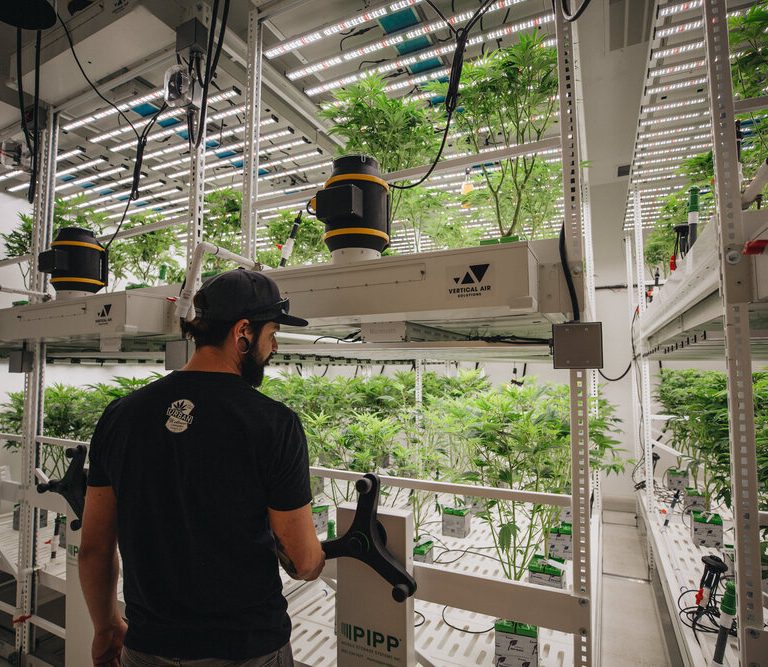
The adult-use cannabis market is on the rise on the east coast of the United States, opening up new opportunities for those interested in opening a marijuana micro business. March of 2021 saw the joining of New York into the recreational use cannabis market alongside New Jersey, Maine, Massachusetts, Vermont, Virginia, and Washington D.C. Now, the industry is expected to see a massive revenue increase of over $7 billion dollars annually and cultivators across the coast are scrambling to get licensing in order to open their own cannabis cultivation facilities.
Some states have created a new class of licenses that are geared to smaller operations, creating opportunities for entrepreneurs from all walks of life, with fewer licensing fees and barriers to entry. Micro-licensing (or a cannabis micro business license) often allows for vertical integrations and sets limits for operators to grow up to a specific number of plants and process these plants into a variety of extracts and edibles. The number of allotted plants differs from state to state; but this license type often allows licensees to sell their cannabis product directly to consumers, creating a win for all involved.
Below is a closer look into the east coast’s micro-licensing policies and how they directly affect and promote vertical farming and grow space optimization.
Micro business License Regulations & Requirements
While micro-licensing may seem like an easy way to start a cannabis business, it is still an expensive and lengthy process that includes ownership, size, and operational limits not imposed on other license types. In order to obtain a micro license for cannabis business production, there are many rules and regulations that must be approved by the state and municipal licensing committee.
Operating Space
Operating space is one of the most important factors in obtaining a micro business license. In New Jersey, proposed regulations limit the business operating space to no more than 2,500 square feet (and, in the case of cultivators, can have a height of no more than 24 feet). Exact facility regulations vary from state to state, but operational spaces are often also capped at a certain number of employees.
Production Volume
Aside from operating space, there are also many limitations on the monthly production volume for a cannabis micro business. Some states create limits of 1,000 cannabis plants per month or limits of 1,000 pounds of usable cannabis per month, and typically include infused products and concentrates. . All these numbers differ depending on location, so it is important to check with the local licensing committee to get the most up to date and accurate numbers.
The key to operating a marijuana microbusiness license is to create an efficient facility design and production plant that accounts for restrictions and limitations imposed while taking advantage of the allowances provided for micro business license operators. Staying compliant with production volume and operational restrictions is essential. Producing too much or violating space restraints can cause a fine or even worse, forfeiture of your license, thus inhibiting business growth and opportunities.
Availability of Licenses
While recreational use may be legal in the state, municipalities still have the ability to opt-out of allowing recreational sales. Once a state’s municipality has opted in, there will be a set number of annual micro business licenses available. Due to limited license availability, there is a high level of competition amongst cannabis business owners for the first spot of approval. There will be information at local municipality offices regarding permitted cannabis zoning districts, availability of licenses, and other items.
Vertical Farming Integration
As discussed before, cannabis micro business licensees are faced with many space and production volume requirements. More often than not, buildings in properly zoned areas are also in high demand and quickly sell and lease, creating a shortage of available properties. This lack of cultivation and operating space makes every square foot of the business critical.
Many potential cultivators will be forced to take what they can get and make the best of what they have. This is where vertical farming plays a vital role in the success of the micro business owner.
Maximize Fixed Spaces
Vertical farming can maximize capacity within a fixed space, making it ideal for cannabis micro-businesses to achieve production goals while staying within space constraints. Mobile vertical racking systems can accomplish this by increasing overall canopy space by the elimination of stationery aisles, by creating a more dynamic grow space.
Increase Efficiency
Keeping operational costs to a minimum is essential when starting a micro cannabis business. There are many elements in cannabis grow that contribute to overarching facility costs and return on investment. Making the switch to vertical farming will maximize the efficiency of utilities, LED lighting, irrigation, and HVAC systems. When COGS systems are well structured, increases in revenue follow shortly after.
Essential Vertical Farming Equipment
Working with many license restraints is one of the biggest hurdles a cannabis micro business owner may face. Pipp Horticulture has developed a variety of products to help operators and micro business owners throughout the entire seed-to-sale process so they can optimize their space.
#1: Propagation
Propagation is a delicate time in a plant’s life. It’s imperative to ensure the space is sterile with consistent temperature and humidity settings ideal for early-stage development. This is why carts and shelving units need to be mobile allowing the plants to breathe and prosper in specific temperature settings. Pipp Horticulture’s space-saving products optimize the propagation process giving plants the proper environment for early development. These essential items are:
- Cloning Carts
- Wire Carts
- Stationary Shelving
#2: Vegetative
During this period of rapid growth, plants may need to be transferred to larger pots or soilless media. This ensures an ideal grow environment for roots and foliage to develop rapidly. Using a stagnant racking system can generate a disadvantage by creating difficult transfers that often require more manpower in the grow facility. Pipp Horticulture has a variety of tools that support the vegetative process and remove the difficulties of transfers. These products include:
- Mobile Vertical Grow Racks
- ELEVATE Platform System
- Grow Trays
- Vertical Air Solutions
#3: Flowering
Flowering or Bloom is the final stage of growth for the cannabis plant. Establishing a sterile, well-vented, and controlled environment will pay big dividends. Similar to the vegetative stage, these Pipp Horticulture products also aid the flowering process
- Mobile Vertical Grow Racks
- ELEVATE Platform System
- Grow Trays
- Vertical Air Solutions
#4: Harvesting
It’s critical to create an efficient system within the regulatory framework that conserves labor while minimizing touches and plant damage. This is where a facility needs easy and portable racking systems to save time and money on manpower. Pipp Horticulture can optimize this process through these key products:
- Drying Cart
- Nesting Dry Rack
- Wire Grid Trays
FIND PIPP’S HARVEST EQUIPMENT ESSENTIALS BELOW:
#5: Drying
Creating a sound thought-out post-harvest strategy is as important as the efforts spent throughout cultivation. Pipp Horticulture’s post-harvest tools are built to equip cannabis micro business owners and improve the drying process. These tools include:
- Dry/Cure Mobile Storage System
- Drying Cart
- Nesting Dry Rack
- Wire Grid Trays
#6: Cure/Storage
Depending on the scale of a facility, this phase can account for a great deal of space. A grow facility needs drying racks that deliver ease of use, safety, and long life. Pipp Horticulture’s has a line of products built to support this phase. These products include:
- Mobile Storage System
- Secured Storage
- Lockable Mobile Storage System
- Wire Grid Security Cage
#7: Vault
It is vital that these spaces are secure and provide access control and tracking. This will ensure only the appropriate credentialed staff may enter. Grow facilities need effective locks and lockers in order to keep cannabis goods safe. Pipp Horticulture understands the importance of cannabis security and created a variety of solutions for cannabis micro business owners. These solutions include:
- Mobile Storage System
- Lockable Mobile Storage System
- Secured Storage
- Wire Grid Security Cage
- Lockers
#8: Distribution
During this phase, it is important to keep the product safe and isolated while also creating accessibility for testing. Pipp Horticulture provides space-saving products that ensure easy access without affecting the integrity of the plant. These products include:
- Mobile Storage System
- Secured Storage
- Lockable Mobile Storage System
- Wire Grid Security Cage
#9: Retail/Dispensary
Efficient storage in the back of the house provides more space for sales generation and the ability to carry a broader range of products. Training staff to properly retrieve and lock up cannabis is essential. Pipp Horticulture’s retail and dispensary products are built to serve the cannabis business owner. These back-of-house products are:
- Mobile Storage System
- Lockable Mobile Storage System
- Secured Storage
- Wire Grid Security Cage
- Lockers
If proper licensing protocols are followed, owning a micro business can be a very fruitful and effective way to grow a cannabis brand. When starting a licensed grow, optimizing space is critical to getting the most out of every square foot of the facility. Pipp Horticulture’s vertical grow racks help utilize unused cubic feet by stacking multiple layers of cannabis and other high-value plants.


